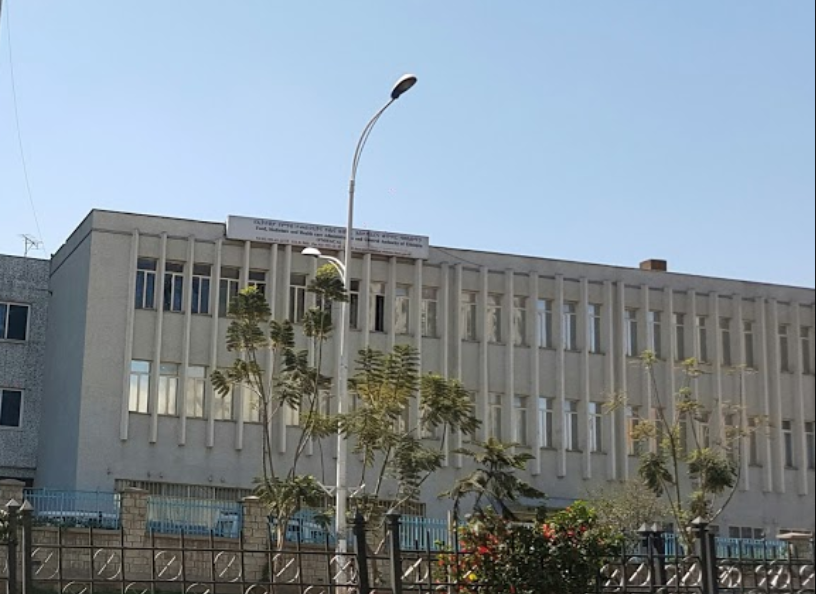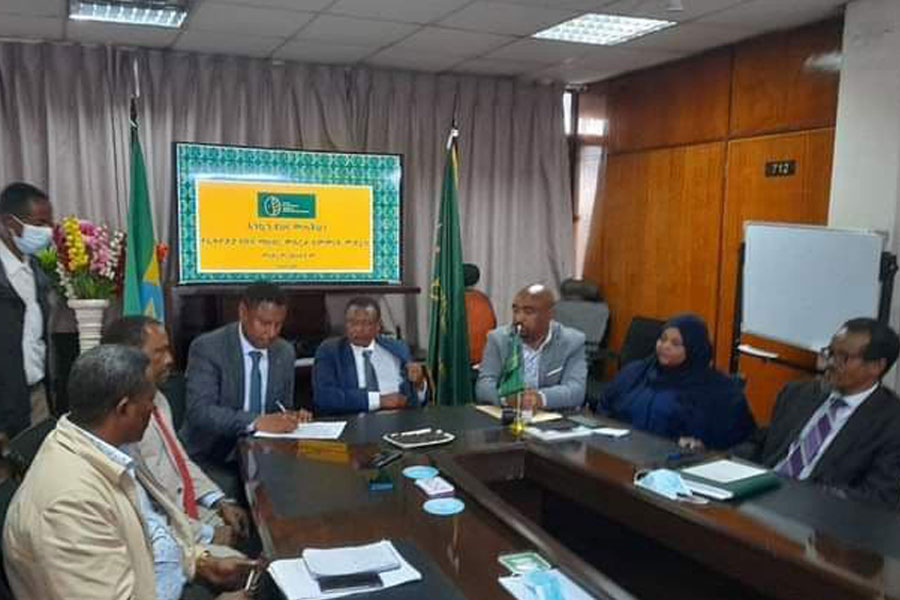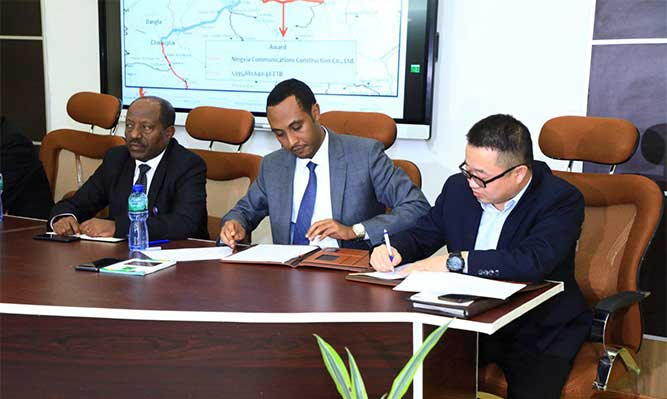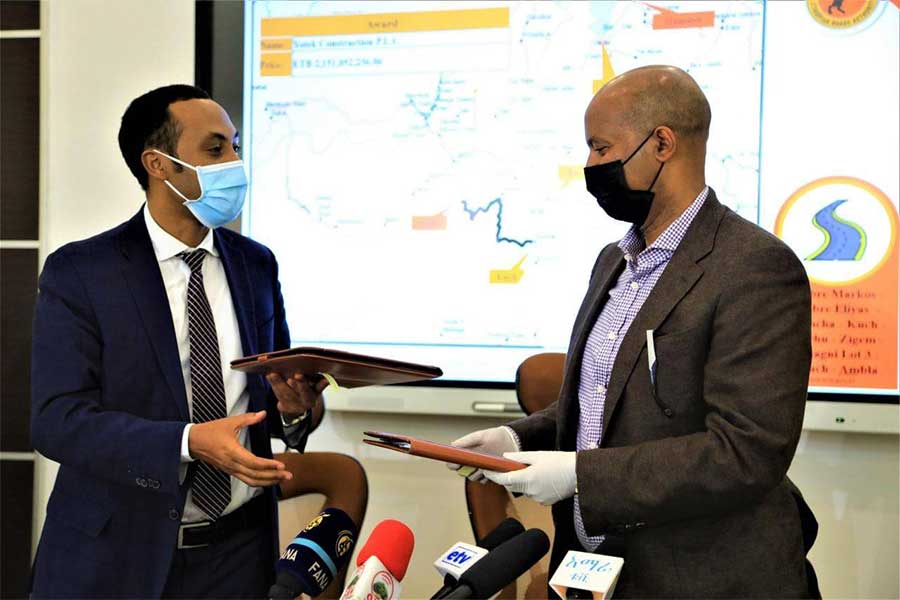
Radar | Nov 23,2019
Coffee producers, exporters and processors are in a dilemma as the Ethiopian Coffee & Tea Authority readies new quality inspection and certification centres built in Jimma and Hawassa cities to become operational next month.
The Authority receives about 70pc of the coffee supplies from the Southern and Western part of Ethiopia with plans to take produce from Metu, Illubabur, Buno Bedele, Kefa, Sheka and Benchmaji towns to Jimma centre while Yirgacheffe, Sidama, and Guji will go to Hawasa centre.
According to Director General Adugna Debela (PhD) constructing the centres will ease labour, and save high logistics costs for stakeholders.
The Authority has been working through its branches in Addis Abeba and Dire Dewa cities.
The additional quality centres bear good news for Kirubel Fikresellasie, export manager at Daye Bansa Coffee. He believes it will result in better efficiency and productivity.
Daye Bansa Coffee is a coffee producer and exporter based in Addis Abeba that earned 36 million dollars in revenue last year. The company has been in the business for the past 25 years.
According to Kirubel, the company would save time and transportation costs by 40pc if they export coffee directly from Hawassa as they were compelled to wait for a long time due to the overload at the Addis Abeba branch.
He predicts that experts who make their way to the coffee farms will get the chance to experience how the coffee is produced than being confined to tasting.
The idea seems lost for Reqiq Haile who fears it will create more hustle for international buyers.
She anticipates they will be losing foreign customers that make regular visits with their experts to check the quality. Incorporated in 2016, Moredocofe is a coffee grower, processor and exporter company around the Kality area.
"They won't be toiling around different places to taste each coffee sample," she said.
Close to 80pc of exported coffee is sent by 60 of the 1,500 exporters in the country.
The head of the Office for the Director of the Authority, Mohammed Shemsu, remarks the centres will address problems in vertical integration where buyers would have a delay of the product after the payment has been made. He said the centres are set to be operational in the coming month, with an ambition to expand to other regional states.
The centres are expected to facilitate effective cost management, getting rid of more than a dozen intermediaries from the supply chain and making the price less expensive and internationally competitive, according to Mohammed.
"We foresee direct coffee export from growers in the future," he told Fortune.
He said technical facilities and professional human resources have been prepared alongside construction for the past two years.
Experts argue the idea of constructing centres from scratch while there are sufficient infrastructure and experienced professionals is not practical.
Mengistu Tadesse owner of a private coffee consultancy firm established eight years ago worked at the Ethiopian Coffee Quality Inspection & Certification Centre for 14 years from junior coffee sommelier level to director of the centre. He consulted 11 coffee exporters that joined the business last year.
For Mengistu, transporting empty containers from the capital to the towns such as Jimma adds extra cost if the plan entails using the Djibouti ports.
"It won't alleviate high logistics costs," said Mengistu.
Last year Ethiopia generated 1.4 billion dollars in revenue from more than 280,000tns of coffee exported, with plans to reach 1.8 billion dollars this year. The Authority stands 22pc short of its revenue plan according to the past eight months' report where 143,762tns of coffee was exported, generating 787 million dollars in revenue.
Mengistu says the last year's result was achieved probably due to high increase in number of exporters or due to the increased demand in the global coffee market coupled with the rise in the global average coffee price. He suggests seriously controlling informal intermediates and focusing on balancing local prices with international ones.
PUBLISHED ON
Mar 25,2023 [ VOL
23 , NO
1195]

Radar | Nov 23,2019

Radar | Mar 23,2019

Fortune News | Apr 12,2020

Radar | Sep 06,2020

Fortune News | May 27,2023

Radar | Jan 23,2021

Fortune News | Feb 24,2024

Fortune News | Sep 26,2021

Fortune News | Dec 07,2019

Fortune News | Feb 06,2021

Dec 22 , 2024 . By TIZITA SHEWAFERAW
Charged with transforming colossal state-owned enterprises into modern and competitiv...

Aug 18 , 2024 . By AKSAH ITALO
Although predictable Yonas Zerihun's job in the ride-hailing service is not immune to...

Jul 28 , 2024 . By TIZITA SHEWAFERAW
Unhabitual, perhaps too many, Samuel Gebreyohannes, 38, used to occasionally enjoy a couple of beers at breakfast. However, he recently swit...

Jul 13 , 2024 . By AKSAH ITALO
Investors who rely on tractors, trucks, and field vehicles for commuting, transporting commodities, and f...

Jul 5 , 2025
Six years ago, Ethiopia was the darling of international liberal commentators. A year...

Jun 28 , 2025
Meseret Damtie, the assertive auditor general, has never been shy about naming names...

Jun 21 , 2025
A well-worn adage says, “Budget is not destiny, but it is direction.” Examining t...

Jun 14 , 2025
Yet again, the Horn of Africa is bracing for trouble. A region already frayed by wars...